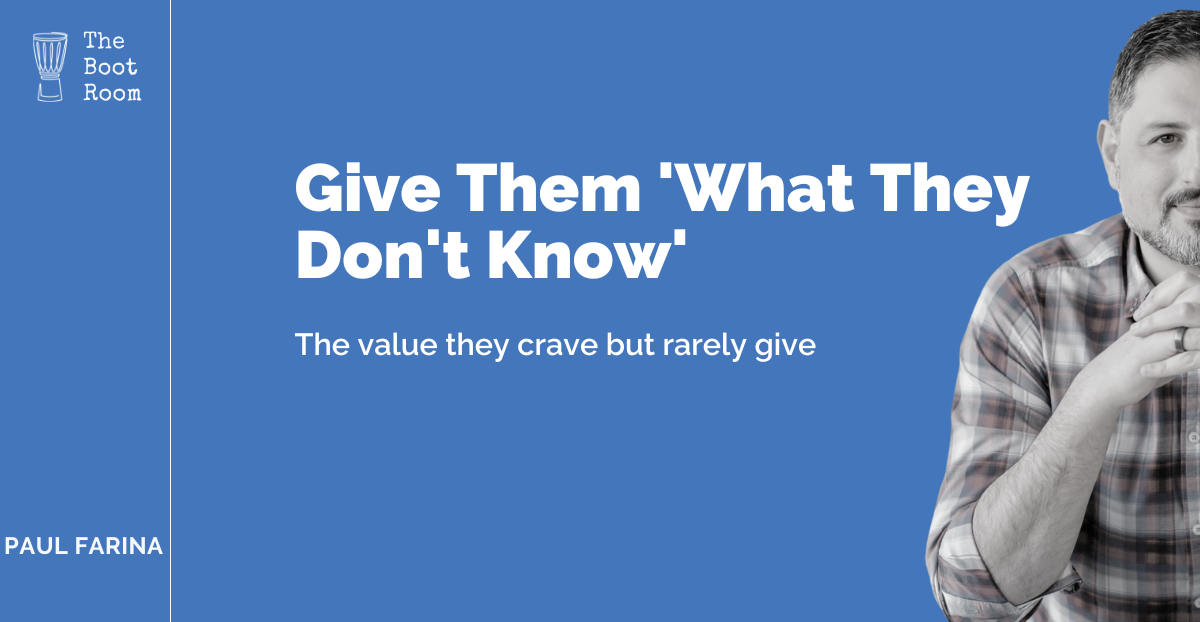Give Them 'What They Don't Know'
A few weeks ago I had a meeting with a potential client across town. The meeting was great. I met with intelligent people, engaging in real commercial challenges, and wanting to do purposeful work. They couldn't have been more accommodating, generous, and warm as we dug into serious and consequential topics for their business and people.
I left feeling somehow enlivened. And, it was a bit weird. On reflection there was some torrid stuff we discussed. Yet, I felt invigorated. This was very different to what I felt a few hours earlier.
On a day such as this I work with my team to book a few appointments into my schedule to maximise the 'time on the road'. After years of B2B sales driving around East Anglia and Essex in my Audi A4 (damn I loved that car), these habits die hard.
An earlier meeting that day had been cagey, a bit of you-show-me-yours-before-I-show-you-mine. This is common, and is understandable. But, when I tried to learn about the business and where I could add value, they just didn't seem to have a clue. There were platitudes a plenty and a few broad strokes, but nothing that connected or was helpful for me to engage with. I left feeling deflated. I felt like I had failed, was a bit dim, and had not bought my best-self.
Yet, reflected further and landed at this thought... how can the same person (me) come into a meeting with a similar approach and have such a different experience. One energised me, the other deflated me - something which is happening too often and to too many.
It made me think deeply about our meetings. Why we meet, and how to make our meetings more impactful.
Insights Equals Energy
When running my Communicate Like a Pro program I put people through a boot camp style experience where they need to take their real world work through a process to rigorously create a message and then deliver it in front of the group. There is one mistake most people make which I believe is the critical point between deflate or energise. Often their key points and messages they want to deliver are ones their audience already know.
If you are a Marketing Manager presenting an idea on a new promotion to your executive team then giving sales data the Sales Exec already knows is going to bore that side of the room. Giving stock levels and lead times that the Logisitics Exec is familiar with is most likely going to land flat.
We know this intellectually, but when creating our messages we consistently fall into this mistake.
This was the biggest difference between the two meetings on my mini-road trip. One gave me insights I had no idea about beforehand. I learnt about numbers, history, key actors, observations, goals... the list goes on. In fact, I wish I had recorded it to retain all the gold. The other one? To paraphrase the famous line from Billy Madison, 'I felt dumber for being in the meeting'. That sounds harsh, but there really were no insights at all that I gained. We often call this a waste of time, but it is also a waste of reputation and opportunity.
The person able to present insights (the nuance, updates, trends, facts, experiences) the audience wasn't aware of before coming into the meeting will be the most influential in the room.
This sounds obvious, but it is missed so often. And, it is killing our meetings, which often become a cost centre and the place where motivation and energy go to wither and die.
The Road to Better Insights
A friend of mine is a genius. He truly is. He is also deeply private so he will remain anonymous. But, I have to share what he shared with me once. Very casually and as a part of a larger conversation. He spoke the words 'What do you know?'
This question is disarmingly brilliant for many reasons. It cuts through the stories we tell ourselves, the rubbish we read/think/hear, and the millions of distractions we are submitted to. But, it is also a wonderful place to start in terms of your audience. Once we acknowledge what they know, we can then hone our research, ideas, and key points into the areas they don't know.
All of the sudden your information becomes true insights. The word 'insight' basically means, to give vision for a better or deeper understanding. If people get this from meeting with you there is no doubt they will be interested, curious to know more, and eager to buy-in to whatever you are proposing. Or, at the very least the odds will be improved compared to the alternative.
Our meetings are often, yet they are precious. With good quality thought and intention into the insights you can bring there will be a lot of value and benefit for all that meet with you. And people will be more than happy to drive, fly, or just make time for you whenever you want to meet.

